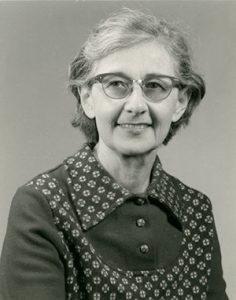
Marianne Ferber worked in the Economics Department at the University of Illinois from 1955 to 1993. Professor Ferber’s research was groundbreaking in the research of gender pay inequality, specifically as it pertained to the academic field.
Marianne Ferber was born Marianne Abeles on January 30, 1923 to a Jewish farming family in Sudetenland, Czechoslovakia. Her family immigrated to Canada in 1938.
During World War II, she received her undergraduate degree in Economics at McMaster University in Canada. Marianne moved to the United States when she was accepted into the prestigious Economics Doctorate Program at the University of Chicago and received her Ph.D. in Economics in 1954. While studying at the University of Chicago, Ferber recalled there being no female faculty and only two women in the doctorate program within the Economics Department.
It was at the University of Chicago where she met her husband Bob Ferber. The two moved to Champaign-Urbana in 1948 when Bob Ferber received a job as an Economics Professor at the University of Illinois. Due to strict nepotism rules the university had in place, Marianne was not allowed to work as a full-time professor, since her husband was a professor in the department.
Despite this rule, the economics department did hire Dr. Ferber as a lecturer on a semester-by-semester basis starting in 1956, two years after she graduated. In 1971, Dr. Ferber was offered an assistant professor position and in 1979, Marianne Ferber became a full professor.
Dr. Ferber also served as the head of the women’s studies department from 1979 to 1983 and 1991 to 1993. While a professor at Illinois, Dr. Ferber conducted innovative research on gender pay inequality. She worked with other Illinois economists and graduate students to publish new insights into the gender pay gap within America. In 1987, Ferber published Women and Work, Paid and Unpaid which was an astonishing catalog of economic research on women’s work even before the notion of feminist economics emerged. Her work focused on the University of Illinois and even led to some women receiving raises. She spent much of her career focused on women and labor issues from an economic perspective.

She also published papers in a variety of journals and books. Ferber’s textbook, The Economics of Women, Men, and Work, co-authored with Francine D. Blau, is currently in its 7th edition. Ferber worked with co-authors on most of her publications because she did not know to take statistics in her coursework (in fact she didn’t even know what economics was when she picked it as a major). In a 1999 interview, she mentions that she did enjoy working with coauthors (King and Saunders 1999).
Dr. Marianne Ferber was a pioneer in the study of female economics and was a founding member of the International Association for Feminist Economics (IAFEE) in 1995 and served as the IAFEE’s President in 1996. Dr. Ferber was a long time supporter and active participant for the Program for Women and Gender in Global Perspectives.
She devoted her career to studying the role of women in the economic field and the deep history of socioeconomic and gender biases within our culture they must overcome. Dr. Marianne Ferber retired as a professor from the University of Illinois in 1993. Dr. Ferber passed away in 2013 at the age of 90.
– David Kinley Hall – Where the department of economics is currently located.
Buchholz, K. (2019, August 22). Chart: The Gender Pay Gap Visualized. Retrieved from https://www.statista.com/chart/3958/gender-pay-gap-by-ethnicity/ Ferber, Marianne A.: Economics. (2019). Retrieved from https://economics.illinois.edu/spotlight/historical-faculty/ferber-marianne Gender and Women’s Studies, University of Illinois. (2019). Marianne Ferber Award: Department of Gender and Women Studies. Retrieved from https://gws.illinois.edu/award/marianne-ferber-award King, M.C. & Saunders, L. F. (1999) An Interview with Marianne Ferber: Founding feminist economist. Retrieved from: https://www.tandfonline.com/doi/pdf/10.1080/095382599107183 Marianne Ferber. (1978, Dec 9). Faculty, Staff and Student Portraits, 1933-, Record Series 39/2/26, Box 21, Ferber, Marianne.University of Illinois Archives. Simpson, P. Saying Goodbye to Marianne Ferber. (August 2013). Retrieved from http://publici.ucimc.org/2013/08/saying-goodbye-to-marianne-ferber/
